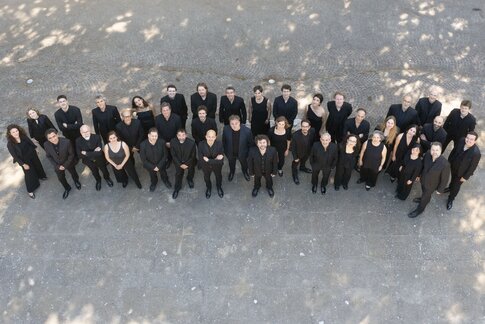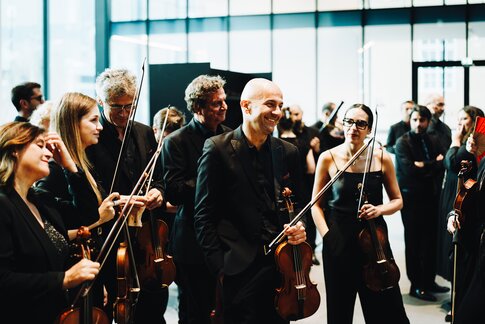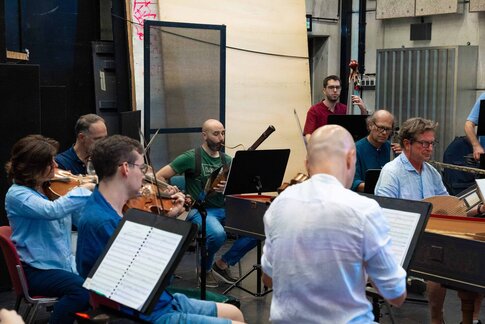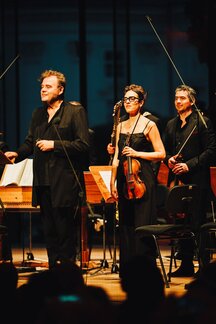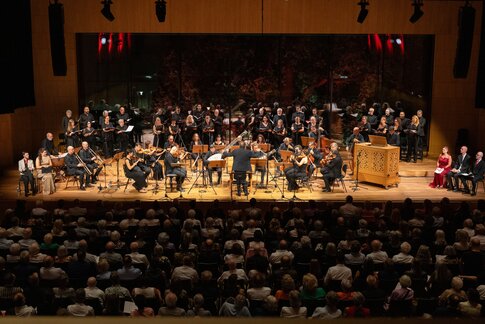Ottavio Dantone
Ottavio Dantone has been appointed Music Director of the Innsbrucker Festwochen der Alten Musik until 2028.
As a harpsichordist, organist, conductor and ensemble director of the Accademia Bizantina, he is at the forefront of the international scene in the field of Early Music and historical performance practice. A musician through and through, Dantone is also a visionary who combines sound historical performance practice with contemporary interpretation in an extremely virtuoso yet nonchalant manner. His authority stems entirely from the charismatic power of his collaborative music-making; he does not try to impose it through airs and graces. When he conducts operas from the harpsichord, as was the historical norm, he guides singers and musicians through the scores with breathtaking intuition and inspires them to perform at their best.
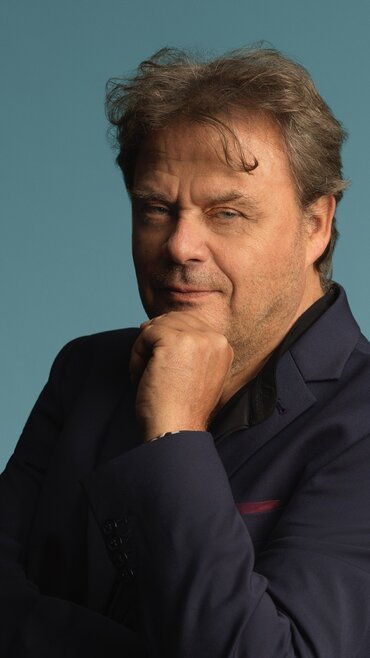
Accademia Bizantina
The "orchestra in residence" of the Innsbrucker Festwochen introduces itself:
Accademia Bizantina: where does the name come from?
We started out in Ravenna, the ancient capital of the Eastern Roman Empire known for its magnificent multicoloured mosaics. We like to think of ourselves as many tiles of different shades and shapes that come together to form a more complex and intriguing image. At the same time, we pursue a genuine academic activity of disseminating musical culture.
Does it have anything to do with being “Interpreters of Baroque Suggestion”?
Yes, it does. Through our work as scholars and performers, we give voice to the suggestions of the Baroque era so that modern listeners can experience the atmospheres and feelings of that time. After all, emotions are ageless.
Everyone pictures the rock band starting out in a garage… but where and how does an early music ensemble come into being?
Well, in our case, everything started at a bar table. It was 1982 and three classmates at the conservatory, with uncommon talent and resourcefulness, got together for a coffee: they were Angelo Nicastro, a violist and now the director of the Ravenna Festival, Romano Valentini, a pianist, organist and harpsichordist, as well as the orchestra’s general manager in the 1990s and 2000s, and Luciano Bertoni, an excellent violist.
And then what happened?
They were very driven and inspired: they decided to call in the best students from the Ravenna Conservatory and in 1984, together with cellist Paolo Ballanti and violinist Paolo Zinzani, they founded an association by the name of Accademia Bizantina. They set to work right away – indeed, the first official concert was held on the 2nd of June of the same year, in the Church of San Giuseppe in Marina di Ravenna, conducted by Filippo Maria Caramazza, AB’s first permanent conductor, and accompanied by A. Patrignani as soloist.
When did you first meet baroque music?
It all happened quite gradually. Mauro Valli, then first cello, gave much momentum to this change of direction, so much so that in 1989 Accademia Bizantina recorded Corelli’s Opera Omnia, led by the then conductor and violinist Carlo Chiarappa. On that occasion, we also met Ottavio Dantone for the first time, who was invited to play in Op. 3. and later became the main force behind our baroque breakthrough.
Was it love at first sight?
Exactly, we instantly liked and understood each other. Ottavio soon became the orchestra’s harpsichordist, then gradually became concertmaster and conductor, alternating in this role with Chiarappa until 1996, when the orchestra decided to fully entrust him as our conductor and maestro, as well as the founder of our interpretative method. Since then, we have focused entirely on the Baroque repertoire.
What constitutes the Ottavio Dantone – Accademia Bizantina method?
Ottavio Dantone is not only one of the best harpsichordists and organists in the world, he also has a profound knowledge of the expressive codes of the Baroque era. His system, shaped by experience and an ongoing philological research, allows him to read ancient scores as if he were a contemporary of the time, i.e. taking into account practices and performance canons that were then considered implicit and, therefore, unwritten. The result is a more three-dimensional music, rich in nuances, that can touch the soul.
Is this the secret of “The Exciting Sound of Baroque Music”?
Exactly. This is how we are able to recreate the composer’s original intent, the sounds he imagined, the effects he sought: ultimately, we release the authentic and exciting sound of Baroque music in all its original expressive power.
What is the Accademia Bizantina today?
We are a big family that flies in from all over the globe to get together! Some from South America, some from Europe, some from Russia… And let’s not forget the outstanding Italian talents, such as our first violin Alessandro Tampieri, concertmaster since 2011.
